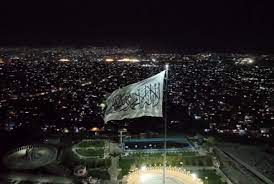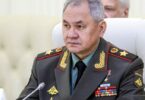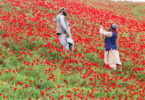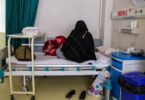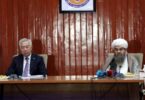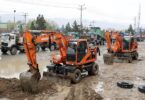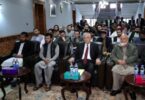KABUL (TOLOnews): More than twenty global meetings were held in 1402 Solar year regarding Afghanistan, many of them not attended by any representative of the Islamic Emirate.
The formation of an inclusive government, preventing the use of Afghanistan’s soil against other countries, combating narcotics, and observing human rights, especially the rights of women and girls, were demands that were consistently raised in these meetings; demands that, according to the Islamic Emirate, are all being observed in Afghanistan.
The EU-Central Asia meeting in Kazakhstan, the Oslo Forum in Norway, the Shanghai meeting hosted by India, the Astana meeting in Kazakhstan, the Samarkand meeting in Uzbekistan, the Moscow format meeting in Kazan, and the Herat security meeting in Tajikistan were among the important meetings regarding Afghanistan.
Asif Ali Durani, Pakistan’s Special Representative for Afghanistan, stated in one of these meetings concerning peace in Afghanistan: “Pakistan believes that by engaging with the current authorities in Afghanistan, we can help bring peace to this country and tranquility to the people of Afghanistan.”
The representative of the Islamic Emirate was present in some of these meetings, including the Moscow format, the Oslo Forum, and Samarkand.
Amir Khan Muttaqi, the Acting Foreign Minister, said in one of these meetings: “My country, Afghanistan, after more than four decades of invasions by foreign countries, war, and chaos, as it steps towards security and stability, faces sanctions for employing human rights.”
Alongside these meetings, meetings of the political opponents of the Islamic Emirate were also held abroad, where the situation in Afghanistan was discussed in various aspects. The “Afghanistan between Past and Future” meeting in Moscow and the Vienna meeting in Austria were among the important meetings of the political opponents of the Islamic Emirate this year.
The conduct of these meetings was not without reaction. Some officials of the interim government, including Shir Mohammad Abbas Stanikzai, the Political Deputy of the Ministry of Foreign Affairs, and Mawlawi Mohammad Yaqoob Mujahid, the Acting Minister of Defense, called the organization of such meetings abroad biased and a conspiracy against Afghanistan.
The first Doha meeting on the situation in Afghanistan was held in this year, lasted two days, discussed important issues including human rights in the country.
The second Doha meeting was also held in the month of Dalw (18-19 February 2024). The meeting was supposed to appoint a Special Representative of the United Nations for the implementation of recommendations of the independent assessment by the United Nations Special Coordinator with the goal of reintegrating Afghanistan into the United Nations; however, at the end of this meeting, António Guterres added that they would also consult with the Taliban for appointing this representative; an issue that remains unclear.
Guterres said at the end of this meeting to reporters: “We want an Afghanistan that is at peace with itself and its neighbors, and an Afghanistan that is capable of fulfilling international commitments.”
The United Nations Security Council also held at least seven meetings on Afghanistan in 1402.
The Security Council meeting on the independent assessment of the United Nations Special Coordinator in Qaws (December 2023), the Security Council meeting on the outcomes of the Doha meeting and the appointment of a Special Representative in Hoot (March 2024), the Security Council meeting on the United Nations Secretary-General’s quarterly report in Hoot (March 2024), the subsequent Security Council meeting on the extension of UNAMA’s mission, the Security Council meeting on the extension of the mandate of the Monitoring Team on sanctions against the Islamic Emirate, the Security Council meeting on children and conflict in Afghanistan, and the Security Council meeting on ISIS and Afghanistan were held during this year.
Nevertheless, these meetings could not pave the way for addressing the current challenges in Afghanistan.
Going to school; dream of girls that did not come true in 1402
Female school and university students from across the country protested until the last days of 1402 (solar year) for the reopening of schools and universities and for access to a brighter future in the country; however, no positive result was achieved.
Various institutions and countries also emphasized the resumption of girls’ education in Afghanistan in the year 1402.
Mariam, one of the students who criticized the closure of schools in the month of Hamal of the year 1402 (first month of the solar calendar), raised the question: “If a girl cannot study and become a doctor, to whom should a sick woman turn?” She said, “Why are schools closed to girls? When there is no female doctor, should a sick woman go to a male doctor?”
The closure of educational institutions’ doors to girls in this year has always faced reactions from countries and global institutions.
Markus Potzel, the UN deputy special representative for Afghanistan, said: “I think that the de facto authorities in Afghanistan should let girls go to school beyond grade six. They should let girls go to university. They should let women work for international NGOs, national NGOs, and for UN organizations. And they should let women participate in social life. If this happens, I can imagine that Afghanistan would be integrated into the international community again, and international donors would also rethink and probably reinforce engagement with Afghanistan.”
Thomas West, the US special representative for Afghanistan, also spoke about the restrictions imposed on women in Afghanistan: “As we engage with the Taliban, we need to keep women and girls’ issues front and center when we talk about other things — it is their families that are bearing the brunt of that dislocation.”
Some officials of the Islamic Emirate also declared their support for girls’ education in the country.
Shir Mohammad Abbas Stanikzai, the Political Deputy of the Ministry of Foreign Affairs, said: “I say once again that the door to knowledge should not be closed and should not discriminate. We need everything, and we need men and women in every field.”
On the 29th of the month of Saratan 1402 (solar calendar), the Kankor exam for the year 1401 was held without the presence of girls among 24,000 candidates in eleven provinces, raising further concerns among female students.
Hadia Mohammadi, a school graduate at that time, said: “We also want to participate in the exam and build our future. Please let girls study too.”
On the 24th of the month of Sunbula (solar calendar), a global foundation under the name “Education Above All” said that Afghanistan is on the list of countries in the worst educational situation.
Maleiha Malik, Executive Director of Protect Education in Insecurity and Conflict (PEIC), said: “There are some persistent countries that come in that list —Afghanistan was on that list persistently. And in Afghanistan attacks on education all sides not only state actors, but also armed non state actors were prevalent. And I think what happened particularly with the media is that the armed non-state actors became more prominent, and it was hard sometimes to see that state parties were also causing massive destruction. The new barriers to education in Afghanistan are still challenging.”
The acting Minister of Higher Education, Neda Mohammad Nadim, during a trip to Tatarstan, Russia, in the month of Jauza of 1402 (solar calendar), sought support for the education sector in Afghanistan and asked neighboring countries to send staff to Afghanistan.
Nadim added in that meeting: “We expect friendly countries to support higher education in Afghanistan by sending professional cadres there or, in their own countries, by providing scholarships to train professional cadres.”
The Acting Minister of Education, Habibullah Agha, in the month of Mizan (solar calendar), promised to provide better educational opportunities for students in the country.
Habibullah Agha, said: “The Ministry of Education is dedicated to providing its educational services in the areas of religious and modern education in all parts of Afghanistan in a balanced manner.”
Although girl students were not allowed to go to school this year, the Ministry of Education announced in the month of Dalw (solar calendar) that more than 35,000 schools and madrasas are active across the country, and thousands are engaged in education.
Mansour Ahmad Hamza, the spokesperson for the Ministry of Education, added: “The leadership of the Ministry of Education has strived to provide services completely to places that were deprived of education and had their rights taken away, and the Ministry of Education is 100% committed to providing balanced educational services to remote areas.”
Mansour Ahmad Hamza, the spokesperson for the Ministry of Education, said: “The leadership of the ministry has always tried to concentrate on forgotten areas of Afghanistan where people were deprived of their rights. We are committed to provide balanced educational services to the deprived areas.”
The academic year in the cold provinces of the country started on the first day of the month of Hoot (solar calendar) without the presence of girls.
Nevertheless, there is still no hopeful news about the reopening of schools to girls beyond grade six and the reopening of universities to female students.
Ups and downs of Afghanistan’s health sector in 1402
In the solar year 1402, the health sector in Afghanistan was not free from challenges.
The scarcity of medical equipment, the discontinuation of aid from some global institutions, the launch of polio vaccination campaigns, and the construction of hospitals are among the significant issues in 1402.
This year, six positive cases of polio were recorded, prompting 12 vaccination campaigns across the country, resulting in millions of children being vaccinated.
Shrafat Zaman Amarkhil, the spokesperson for the Ministry of Public Health, said, “In the solar year 1402, six positive cases of polio were recorded in the country, but only in the eastern region, mainly because of immigrants from Pakistan and internally displaced people, along with other challenges.”
On the 23rd of Hamal (solar calendar), the World Health Organization announced that in 2023, approximately 17.6 million people in Afghanistan would need humanitarian health aid; however, the Ministry of Public Health stated that this number could be higher than the estimate provided by the World Health Organization.
The Ministry of Public Health spokesperson said, “Afghanistan’s population is close to 40 million, and it is inevitable that among them there are sick people. The 17.6 million figure is an estimate; the needs of the patients might exceed this.”
On the 12th of Saur (solar calendar), the Ministry of Public Health announced that female doctors could not register for the ministry’s specialization exam, raising concerns about the reduction of female doctors and the increase in maternal and infant mortality rates in the country.
Najm Sama Shefajo, head of the Afghan Women’s Medical Association, told TOLOnews, “A few years later, we will see a worse tragedy, and many mothers in Afghanistan will be lost. Afghanistan already has the highest maternal mortality rate in Asia, and it will significantly increase.”
On the 2nd of Jawza (solar calendar), the Director-General, World Health Organization (WHO) expressed concern in the organization’s annual report about the increase in polio cases in some countries, including Afghanistan and Pakistan, stating that the organization is committed to eradicating the disease from countries that are struggling with it.
“So far this year, there have been three reported cases of wild polio virus, including one from Pakistan and two from Afghanistan just last week. WHO and our partners remain steadfastly committed to finishing the job of consigning polio to history,” said Tedros Adhanom Ghebreyesus.
On the 21st of Jawza (solar calendar), the Afghanistan section of the World Health Organization announced the establishment of 37 centers for polio virus detection across Afghanistan, and on the 19th of Dalwa, in collaboration with the World Health Organization and global aid agencies, the first polio virus laboratory aimed at eradicating the disease in the country was inaugurated in Kabul.
Qalandar Ebad, Acting Minister of Public Health, said, “For the year 2024, we have set a major goal to completely eradicate polio from Afghanistan.”
Hamed Jafari, Director of the Eastern Mediterranean Polio Programme, said, “It is very important that the two countries work together and coordinate with each other. These two countries cannot achieve this success alone; they must succeed together, as Qalandar Ebad mentioned. Since polio exists in these two countries, they must proceed with coordination to be able to eradicate polio in both countries. The coordination between the two countries should not only be in terms of vaccination but now also at the laboratory level.”
On the 28th of Asad (solar calendar), the International Committee of the Red Cross announced that due to a lack of funds, it would cancel financial support for 25 hospitals in Afghanistan in two phases.
Shrafat Zaman Amarkhil, spokesperson for the Ministry of Public Health, said, “We pay the salaries of all employees of these 25 hospitals that provide health services from our ministry’s budget, and we supply whatever medicines and materials are needed for the diagnostic section from the internal budget.”
This year, several reconstruction and construction projects of some hospitals also began by the Ministry of Public Health, among which was the reconstruction and modernization project of the Jamhuriat Hospital, valued at more than four billion Afghanis.
Qalandar Ebad, Acting Minister of Public Health, said, “Four billion dollars have been allocated to this project, of which we will spend three hundred and seventeen million on the construction part of this hospital, and approximately two billion and six hundred and seventy million will be spent on purchasing medical equipment for this hospital.”
Throughout the year, the Acting Minister of Public Health had five trips to various countries, including Iran, Pakistan, Qatar, and Malaysia, where during his trip to Qatar, he met with representatives of various countries and sought the comprehensive cooperation of the international community in the health sector of the country, and during his trip to Malaysia, he reported in an interview with a Malaysian media that more than 150,000 women are active in the health sector in Afghanistan.
The Acting Minister of Public Health said, “150,000 women are working in the health sector, which is a significant number. Under the previous government, this number of women did not work. We employ women who have experience in various sectors in the health sector. We have institutes for nursing, midwifery, and also various educational programs. We are not opposed to women’s rights. Where women are needed, we keep the door open for them because women are an important part of our society. It is very difficult to manage society without women.”
On the 2nd of Dalwa (solar calendar), the specialty completion exam was held for obtaining 465 positions from more than six thousand doctors, including twelve hundred female doctors.
Haider Omar, head of the Specialization Completion Program of the Ministry of Public Health, stated that these doctors participated in this training from across the country for the 465 announced positions in various medical fields.
This year, various aids were also provided in the health sector.
Japan, by signing a memorandum of understanding with the Afghanistan section of the World Health Organization, provided nearly seven million dollars to the Antani and Afghan-Japan hospitals, and the King Salman Humanitarian Aid and Relief Centre (KSRelief) provided more than one million dollars for providing services to mothers and children in Bamyan province to Afghanistan.
Shamim Mehrzad, a doctor, said, “Access to health services for mothers and children in villages is very limited. Such aids can be life-saving and constructive for mothers and children. If managed properly, it can prevent the death of many mothers and children in villages.”
The Medical Council of Afghanistan, despite establishing its offices in six zones and amidst all the ups and downs and concerns about the lack of female doctors, conducted two rounds of licensing exams for the Medical Council of Afghanistan from more than eleven thousand applicants; however, without the presence of female doctors.
It remains to be seen whether the number of female doctors will increase in the solar year 1403 and to what extent the challenges of this sector will be resolved.

